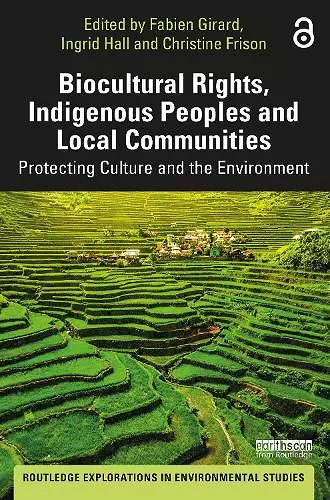Biocultural Rights, Indigenous Peoples and Local Communities
Protecting Culture and the Environment
Christine Frison editor Fabien Girard editor Ingrid Hall editor
Format:Paperback
Publisher:Taylor & Francis Ltd
Published:18th Apr '22
Currently unavailable, and unfortunately no date known when it will be back
This paperback is available in another edition too:
- Hardback£145.00(9781032000855)

This volume presents a comprehensive overview of biocultural rights, examining how we can promote the role of indigenous peoples and local communities as environmental stewards and how we can ensure that their ways of life are protected.
With Biocultural Community Protocols (BCPs) or Community Protocols (CPs) being increasingly seen as a powerful way of tackling this immense challenge, this book investigates these new instruments and considers the lessons that can be learnt about the situation of indigenous peoples and local communities. It opens with theoretical insights which provide the reader with foundational concepts such as biocultural diversity, biocultural rights and community rule-making. In Part Two, the book moves on to community protocols within the Access Benefit Sharing (ABS) context, while taking a glimpse into the nature and role of community protocols beyond issues of access to genetic resources and traditional knowledge. A thorough review of specific cases drawn from field-based research around the world is presented in this part. Comprehensive chapters also explore the negotiation process and raise stimulating questions about the role of international brokers and organizations and the way they can use BCPs/CPs as disciplinary tools for national and regional planning or to serve powerful institutional interests. Finally, the third part of the book considers whether BCPs/CPs, notably through their emphasis on "stewardship of nature" and "tradition", can be seen as problematic arrangements that constrain indigenous peoples within the Western imagination, without any hope of them reconstructing their identities according to their own visions, or whether they can be seen as political tools and representational strategies used by indigenous peoples in their struggle for greater rights to their land, territories and resources, and for more political space.
This volume will be of great interest to students and scholars of environmental law, indigenous peoples, biodiversity conservation and environmental anthropology. It will also be of great use to professionals and policymakers involved in environmental management and the protection of indigenous rights.
The Open Access version of this book, available at www.taylorfrancis.com, has been made available under a Creative Commons Attribution-Non Commercial-No Derivatives 4.0 license
"This is a timely, comprehensive contribution to the literature and practice at the nexus of international environmental law and human rights, that boldly addresses critical questions on the sovereignty and stewardship of biodiversity across a broad range of regional perspectives."
Elisa Morgera, Professor of Global Environmental Law, University of Strathclyde Law School, Glasgow, United Kingdom
"Environmental jurisprudence over the last two decades has been radically transformed. This epistemic shift is symbolized by the waning of the ideas of ownership and the ascent ideas of stewardship when it comes to lands and waters. The shift has been the result of a growing realization that the dominant discourse of private property has played a key role in the collapse of ecosystems and changing climate. Confronted with the existential question of survival of our species, communities, activists and academics have begun to ask ontological questions regarding the nature of the juridical subject. Specifically, what does it mean to be human and what is our relationship to the natural world. The book you have in your hands is a glorious map of stories, histories and analyses of what is arguably the most critical conversation of the Anthropocene. It consists of riveting essays by some of the best contemporary cartographers of political ecology. It is metacognition at its finest and I urge you to read it and let it transform you."
Sanjay Kabir Bavikatte, Co-founder of Natural Justice, Lawyers for Communities and the Environment and author of Stewarding the Earth: Rethinking Property and the Emergence of Biocultural Rights
"In the late 1980s, Darrell Posey and others made the world aware of the inextricable link between biological and cultural diversity. This suggested the possibility of new legal and ethical frameworks, and broad-based actions especially at local level. This exceptional volume builds on Dr Posey’s visionary work, showcasing the latest thinking on 'bioculturalism', an issue whose positive resolution all of us has a major stake in."
Dr Graham Dutfield, Professor of International Governance, University of Leeds, United Kingdom
ISBN: 9781032000817
Dimensions: unknown
Weight: 453g
344 pages